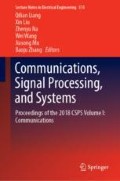Abstract
The communication network often loses connections due to the energy consumption of the equipments, the failures of hardware, and malignant attacks. Therefore, the research of the invulnerable network has important theoretical value and practical significance. On account of the multiple-tree infrastructure of current communication networks, a graph-based model is established for constructing invulnerable network. Specifically, network structure entropy is put forward as the global evaluation metric, and an optimization algorithm satisfying the minimum overhead of the invulnerable constraint is proposed. Simulation results show that the proposed algorithm significantly reduces network overhead while considering network invulnerability compared with ILP linear programming algorithm.
Access this chapter
Tax calculation will be finalised at checkout
Purchases are for personal use only
References
Wu, R.Z., Zou, Y.J., Fan, B.: Research on network invulnerability based on DWS model considering cascading failure in power data network. In: International Conference on Communication Technology (ICCT), pp. 1233–1237 (2017)
Frank, H., Frisch, I.: Analysis and design of survivable networks. IEEE Trans. Commun. Technol. 18(5), 501–519 (1970)
Crucitti, P., Latora, V., Marchiori, M., et al.: Error and attack tolerance of complex networks. Nature 340(1–3), 388–394 (2004)
Crucitti, P., Latora, V., Rapisarda, A., et al.: Efficiency of scale-free networks. Phys. A Stat. Mech. Appl. 320 (2002)
Jothi, R., Raghavachari, B.: Survivable network design: the capacitated minimum spanning network problem. Inf. Process. Lett. 91(4), 183–190 (2004)
Kerivin, H., Mahjoub, A.R.: Design of survivable networks: a survey 46(1), 1–21 (2005)
Soni, S., Pirkul, H.: Design of survivable networks with connectivity requirements. Telecommun. Syst. 20(1), 133–149 (2002)
Balakrishnan, A., Mirchandani, P., Natarajan, H.P.: Connectivity upgrade models for survivable network design. Oper. Res. 57(1), 170–186 (2009)
Chaves, D.A., Bastosfilho, C.J., Martinsfilho, J.F.: Multiobjective physical topology design of all-optical networks considering QoS and Capex. Opt. Fiber Commun. 1–3 (2010)
Heinzelman, W.R., et al.: Energy-efficient communication protocol for wireless microsensor networks. In: Adhoc & Sensor Wireless Networks, vol. 2, p. 10 (2000)
He, J.H., Fan, Y.Z., Li, S.D.: The spectrum of a graph obtained from copies of a generalized bethe tree and a complete graph. Chin. J. Eng. Math. 29(5) (2012)
Tan, Y.J., Wu, J.: Network structure entropy and its application in scale-free networks. Theory Pract. Syst. Eng. 24(6), 1–3 (2004)
Author information
Authors and Affiliations
Corresponding author
Editor information
Editors and Affiliations
Rights and permissions
Copyright information
© 2019 Springer Nature Singapore Pte Ltd.
About this paper
Cite this paper
Zhang, X., Wang, Y., Liu, Y., Guo, W. (2019). An Efficient Algorithm for Invulnerability Enhancement in Cognitive Ad Hoc Networks. In: Liang, Q., Liu, X., Na, Z., Wang, W., Mu, J., Zhang, B. (eds) Communications, Signal Processing, and Systems. CSPS 2018. Lecture Notes in Electrical Engineering, vol 515. Springer, Singapore. https://doi.org/10.1007/978-981-13-6264-4_115
Download citation
DOI: https://doi.org/10.1007/978-981-13-6264-4_115
Published:
Publisher Name: Springer, Singapore
Print ISBN: 978-981-13-6263-7
Online ISBN: 978-981-13-6264-4
eBook Packages: EngineeringEngineering (R0)

